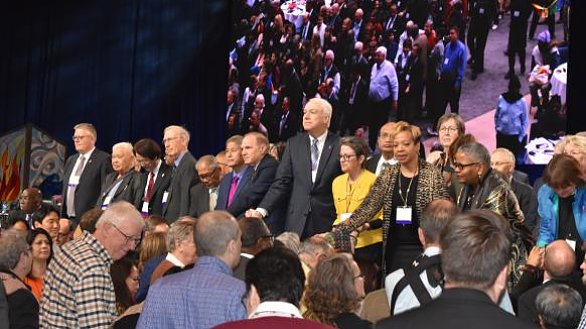General Conference passes Traditional Plan
ST. LOUIS, Mo.––A majority of the 864 delegates to the February 23-26 Special Session of the United Methodist General Conference supported the “Traditional Plan,” which establishes stronger enforcement measures to ensure UM clergy cannot conduct marriage services for same-gender couples. Clergy found guilty of performing such marriages will be subject to a minimum sentence of one-year suspension without pay for the first offense and loss of credentials for the second.
The assembly also provided additional enforcement measures to ensure no self-avowed practicing homosexual will be ordained. They expanded that definition to include people “living in a same-sex marriage, domestic partnership or civil union or is a person who publicly states she or he is a practicing homosexual.”
The assembly allowed churches to leave the denomination with their property after providing first for unfunded pension liabilities and for other conference expenses.
Judicial Council to rule
Delegates asked Judicial Council to rule on the constitutionality of the Traditional Plan. That nine-member council will rule on the issue in an April 23-25 session. The council found problems with early drafts of the Traditional Plan after it was adopted by the Legislative Committee.
If the entire plan is constitutional, it will go into effect on January 1.
Since the presiding bishop ruled that the Traditional Plan could not be divided, it is possible that if any part of the plan is found to be unconstitutional, the entire plan could be considered unconstitutional and would have to be fixed by the 2020 General Conference in order to go into effect in January 1, 2021. In any case, non English-speaking Central Conferences will be given an additional 12 months to implement General Conference decisions.
Background
This is the special General Conference since 1970, when the newly formed United Methodist Church met to iron out details of the 1968 merger of the Evangelical United Brethren Church with the Methodist Church.
In order to address tensions over issues related to homosexuality, the 2016 General Conference in Portland, Oregon, authorized the bishops to form a 32-member Commission on a Way Forward to find ways to help the church stay together.
The Traditional Plan was among the plans to emerge from the commission’s work as did the One Church Plan, which would have left questions of marriage up to individual churches and clergy, and ordination up to conferences. That plan was supported by most bishops, but only received the support of 47 percent of the voting delegates.


